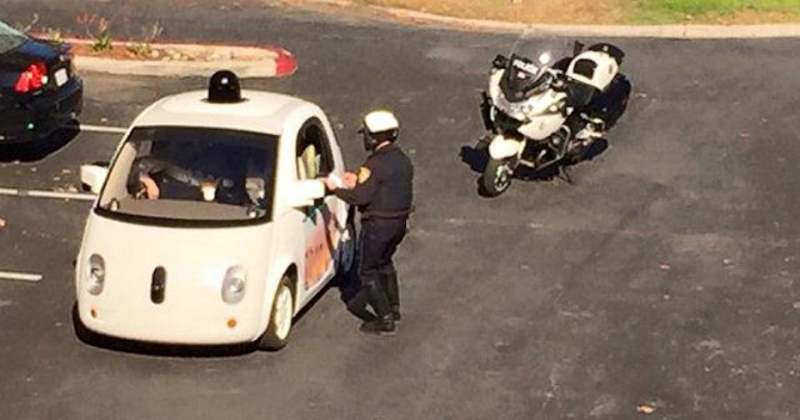
As an increasing number of self-driving cars are tested on US roads, more questions are being asked about the safety of these vehicles and if there’s a chance that they may drive too fast. It seems that now, however, the problem may be that some of these cars aren't driving fast enough, as a California police officer pulled over one of Google’s prototype vehicles yesterday for driving so slowly it was backing up traffic.
“Driving too slowly? Bet humans don’t get pulled over for that too often,” the Google car team wrote in a post. “We’ve capped the speed of our prototype vehicles at 25 mph for safety reasons.”
The incident took place on an eastbound road on El Camino Real in Mountain View, California, home of Google’s headquarters and where it has been testing its fleet of prototype autonomous vehicles over the last few months. The officer approached the car after he noticed it was travelling at 24mph in a 35mph zone, violating California Vehicle Code 22400 (a), which prohibits anyone from impeding or blocking the movement of traffic by driving too slowly.
The Mountain View Police Department, which it says has regular meetings with Google to ensure that the vehicles are being operated safely, said: “as the officer approached the slow moving car he realized it was a Google Autonomous Vehicle. The officer stopped the car and made contact with the operators to learn more about how the car was choosing speeds along certain roadways and to educate the operators about impeding traffic."
The same California code does make an exception for some slow-moving vehicles, where “the reduced speed is necessary for safe operation, because of a grade, or in compliance with law."
Google's self-driving cars operate under the Neighborhood Electric Vehicle Definition per 385.5 of the California Vehicle Code and can only be operated on roadways with speed limits at or under 35 mph. The road where it was pulled over has a 35 mph limit, so it was lawful for the car to be travelling on it.
The company pointed out that while its cars do get pulled over from curious bystanders, they’ve yet to be reprimanded by law-enforcement officials. “Like this officer, people sometimes flag us down when they want to know more about our project. After 1.2 million miles of autonomous driving (that’s the human equivalent of 90 years of driving experience), we’re proud to say we’ve never been ticketed!”
The incident brings up the question of who would get a ticket if a self-driving car did commit a traffic violation, and how would one of these vehicles know to pull over if a police car hailed it – assuming there were no passengers. In this instance there was an operator in the vehicle but, as regulations say a ticket belongs to the person in the driver’s seat, the DMV still has no law in place to say what happens if all the seats inside are empty. But Google did say that it would cover the cost of the ticket if one of its vehicles did break the law.
https://www.techspot.com/news/62773-police-pull-over-google-self-driving-car-driving.html